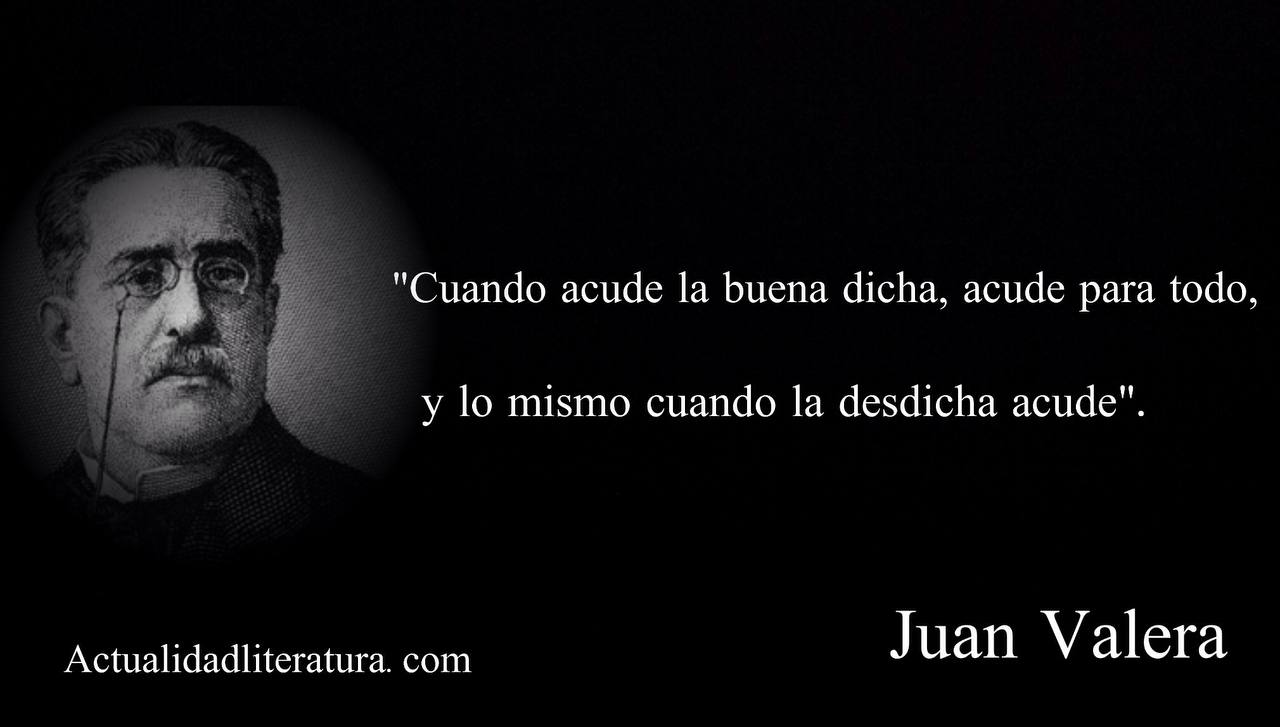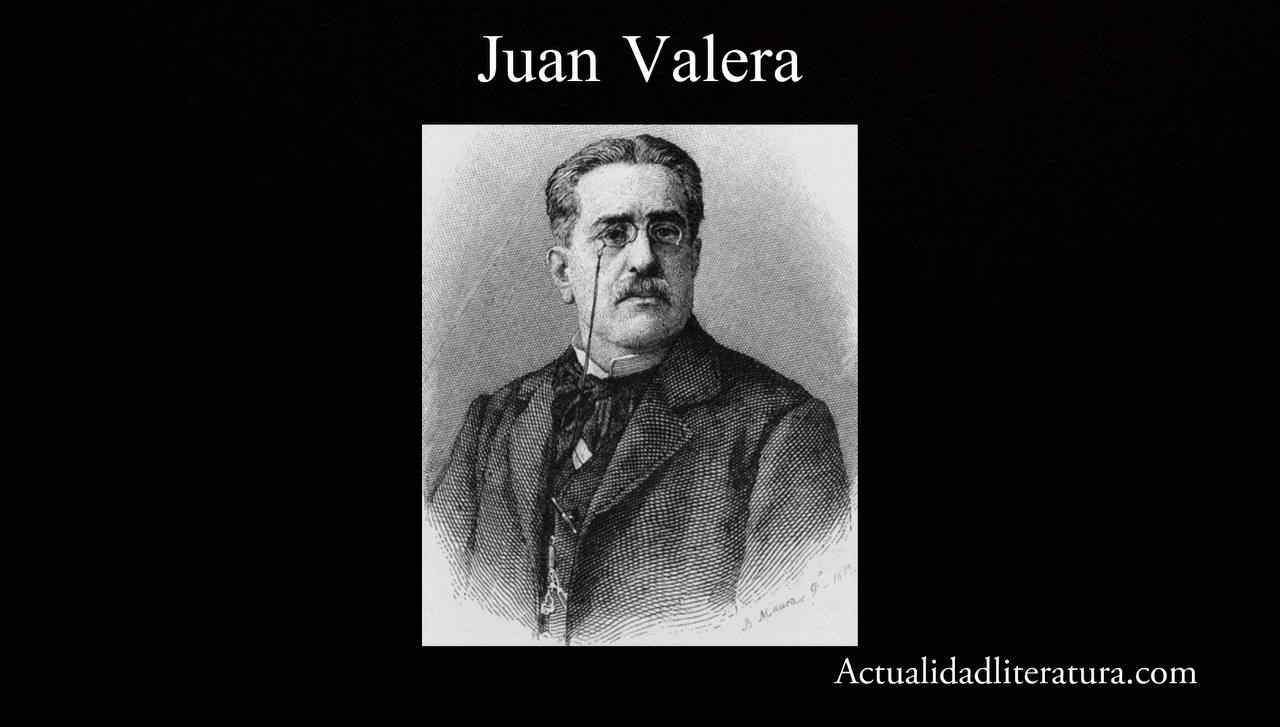
Quote by Juan Valera
Juan Valera is one of the preponderant authors of Spanish literature of the XNUMXth century. His style was unique and incomparable, characterized by showing real life, but in an adorned and idealized way. That's how he created Pepita Jimenez (1874), a story that dazzled readers and critics of the time, becoming a notable work in Spain and the world.
In his prolific career as a writer, Valera ventured into several literary genres, coming to dominate poetry, short stories, epistle, novel and theater.. Many of these works have been reissued and even adapted for film, theater or television. Likewise, over time several compilations of his complete work have been presented, the most recent of which premiered in 1995.
Works by Juan Valera
Pepita Jimenez (1874)
It is the first work of the Spanish, which began to write in 1873 and was published a year later. The author claimed to have prepared the novel from a document discovered in a temple in Andalusia. The text contains two segments: one told as an epistolary text (letter from the protagonist to his uncle) and another fictionalized in the third person.
In 1895, the prominent Spanish musician Isaac Albéniz composed an opera based on the plot of Pepita. Likewise, it was adapted to the cinema on four occasions: 1927, 1946, 1975 and 1978. This latest version was directed by Manuel Aguado and presented in episodes by TVE. A theatrical version premiered in 1896 at the Teatro del Liceo in Barcelona was also produced.
Synopsis
louis de vargas was a student for priest twentysomething He returned home for one last vacation before casting their votes. when meeting again with his father -Mr. Pedro- he introduced him to his fiancée, Pepita Jimenez. Dazzled by the young woman, the seminarian began to doubt his vocation with each encounter with his future stepmother.
Luis began with a great spiritual struggle between divine and human love, which he expressed in letters to his uncle Dean. Finally, passion was stronger than reason and the two young people fell madly in love.. It is then that Pepita pressures Luis to reveal everything to her father, who will surprise them with her reaction.
Lady Light (1879)
This is the author's fifth novel, published for the first time in the Contemporary Magazine between November 1878 and March 1879. As in Pepita Jimenez (1874), its protagonist is torn between carnal and heavenly love. However, the course of events did not lead to a happy ending. Unlike the predecessor, the outcome is quite tragic.
No products found.
Synopsis
Luz was raised solely by her father, the Marquis of Villafría, since her mother —a woman of dubious origin— died when she was two years old. Despite belonging to Madrid's high society, both had to move to a small town in Andalusia. The reason: the aristocrat squandered his fortune during his wanderings in the Spanish capital
Once installed in Villafria, the marquis, who was already financially ruined, got sick and died. Prior to his death, he left Don Acisclo —family administrator— in charge of Luz. So, the young woman became an educated woman with no marriage plans. But, everything changed when she met the friar Dominico Enrique and the military man Don Jaime Pimentel.
Juanita the Long (1895)
It is a romantic narrative published in The Impartial between October and December 1895. The reported events take place in Villalegre, at the end of the XNUMXth century. Its plot revolves around the romance between an older man and a girl.. The novel stands out for its touches of humor, with cultured and colloquial expressions, along with a masterful description of the Spain of that time.
Synopsis
Juanita is one of the YOUNG most beautiful in town, thus, all the men there they want to conquer her. However, she only cares a person: Don Paco, who, in spite of triple his age, also corresponds to it. Meanwhile, both must fight to defend their love against a hypocritical society that considers them lacking in morals.
Genius and figure (1897)
It is one of the author's most recognized books because of the literary stir caused by its theme close to French erotic novels. On this occasion, the action takes place between Rio de Janeiro and Paris, where the high society of both places take part. In complement, the story is inspired by the experiences and love affairs of the Iberian author during his time in the Brazilian city.
Synopsis
Rafaela is an Andalusian woman known as "La Generosa", a lady who, due to her cunning and character, get a good marriage The aforementioned alliance allowed him to stand out in the social elite of Rio de Janeiro and Paris.. However, that did not change her habits that led her to obtain that position, she was known as a "course girl" not in vain.
morsamor (1899)
It is the last work of the Cordovan writer, published in Madrid in 1899. It is a historical adventure novel with some touches of fantasy literature. The protagonist is Fray Miguel de Zuheros, an elderly inhabitant of a monastery with a sullen, angry and dissatisfied character. But one day he begins to leave his frustrations behind when he wakes up turned young by the action of a concoction.
No products found.
Synopsis
Fray Ambrosio de Utrera —magic doctor— gives the main character a numbing elixir. upon awakening, Fray Miguel de Zuheros finds himself rejuvenated. With this transformation, the man decides to venture around the world accompanied by Fray Tiburcio.
On its way, the friars experience endless situations between loves, heartbreaks, triumphs and defeats. This is how the years go by until the protagonist returns to the convent from which he left. There he can close the cycle of his life in peace and imbued with divine love.
About the author, Juan Valera

John Valera
Juan Valera and Alcalá-Galiano He was born on Monday, October 18, 1824, in the Spanish municipality Cabra belonging to the province of Córdoba. His parents were the Navy officer José Valera y Viaña, and the Marquesa de la Paniega Dolores Alcalá-Galiano y Pareja. When the future writer was a child, the family moved to Madrid and soon after to Malaga due to the father's military obligations.
Between the years 1837 and 1840, Valera studied Language and Philosophy at the Malaga seminary. In 1841 he began his studies at Sacromonte in Granada, where he graduated in Philosophy and Law at the University of Granada in 1846. During his time at university he began to publish his first poems and was a faithful follower of romantic poetry.
Diplomatic and political career
In 1847 he began as a diplomat when he joined the embassy in Naples by Ángel de Saavedra, Duke of Rivas. Thanks to this he traveled through Europe and America, where he worked in important Spanish embassies. Eleven years later, he decided to reside in Madrid and provisionally leave the diplomatic corps to devote himself to politics.
Literary career
Started his literary career as a poet with his first book poetic essays (1844), of which only 3 copies were sold. It was in 1874 when he ventured into the narrative genre with Pepita Jimenez (1874) Later, he continued with other successful novels such as: The illusions of doctor Faustino (1875) and Commander Mendoza (1877)
This first stage as a novelist closed with Lady Light (1879), later taking a break due to his worsening blindness. Despite such harsh circumstances, sixteen years later he resumed his literary work with four new narratives completed before his death (occurred on April 18, 1905). Among these works stand out Juanita the Long (1895) and Genius and figure (1897)
Novels by Juan Valera
- Pepita Jimenez (1874)
- The illusions of doctor Faustino (1875)
- Commander Mendoza (1877)
- get smart (1878)
- Lady Light (1879)
- Juanita the Long (1895)
- Genius and figure (1897)
- morsamor (1899)


